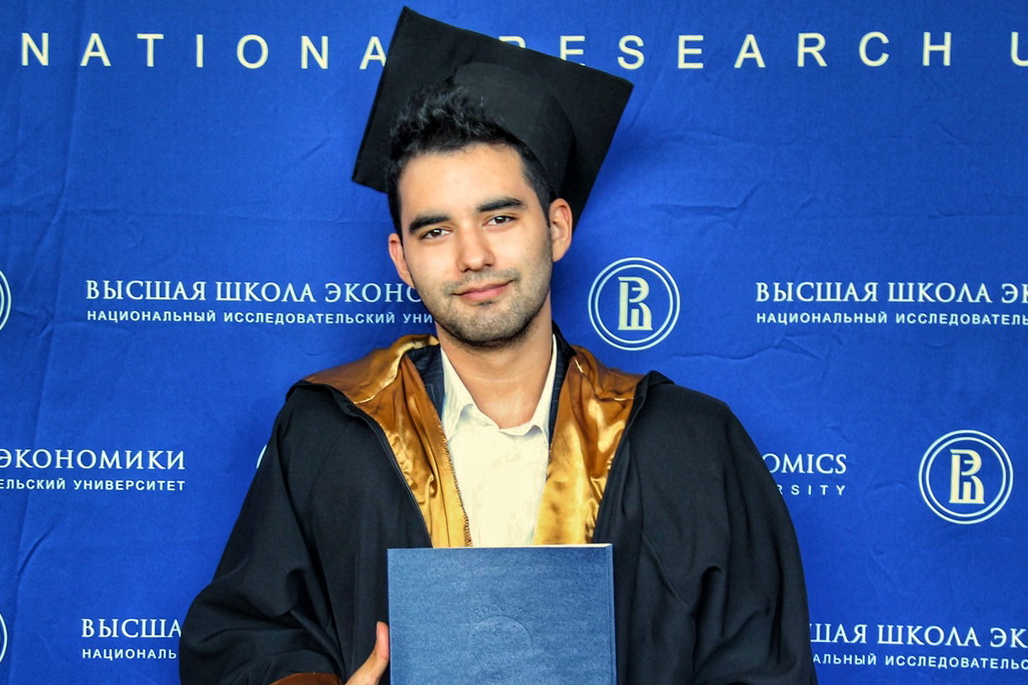Following a Journey from a Small Brazilian Town to Moscow, a Recent HSE Graduate Looks to a Future in Diplomacy

Leandro Cassius, a recent graduate from HSE’s Faculty of World Economy and International Affairs, has long been interested in languages and international affairs. He actually started learning Russian on his own when he was 14 years old and still living in his native Brazil. He would later spend a year taking a Russian course at Belgorod State University before being admitted to HSE.
Looking back, he sees the time he spent at HSE as excellent preparation for the next stage of his career, which is to gain admittance to the Itamaraty Palace, the Brazilian Ministry of Foreign Affairs, and become a diplomat.
‘This an especially difficult task, because it can only be done in the form of an exam that requires extreme preparation and knowledge of four languages, but I am sure that after four years at HSE, I am already more than halfway there’, he says, adding that he looks forward to possibly working in Russia as a diplomat in the future.
Originally from a small town in the state of Mato Grosso, far away from Rio de Janeiro and São Paulo, Leandro was attracted to HSE when he learned from friends about the scholarship opportunities at the university. Initially, it was difficult for him to choose between St. Petersburg and Moscow, but in the end, he decided he would make the most of his four years in Russia if were to study in Moscow given his interest in a diplomatic career.
If you are going to live in the dorm, you will already have too much English in your everyday life, so try your best to get to know your Russian colleagues and explore Moscow with them.
Leandro recalls the first two years at HSE as being one of the hardest times of his life. ‘I hardly had any leisure time, to be honest. I was struggling to have good grades. I had to study basically all day long just to keep up with the rest of my class. My Russian was not good enough and I had to write down lectures that were often three hours long. During the first year I really feared I would be expelled, but in the end, I managed to pass the exams with satisfactory marks’.
The second year proved a little easier, giving Leandro time to start exploring Moscow. He says he got to know almost every park, street and building, surprising some Russians that he got to know Moscow so well. He also enjoyed spending time with other foreign students at the dorm in Studencheskaya and showing them around the city.
‘Moscow sometimes can be frightening and enormous, but it is such a beautiful place, with many amazing, different architectural styles that I simply don't see in Brazilian cities, and I really wanted to know every bit of it’, he says.
Apart from his studies, the long, cold days of winter weather were one of the biggest challenges Leandro faced.
‘My friends often ask how I survived these four years, especially being from a sunny place like Brazil’, he says. ‘Basically, I focused hard on my final goal, told myself every day that going back was not an option, that I would not start over, and that this was my only chance to get a bachelor's degree’.
Leandro looks back at his classes in international relations and foreign languages as being among his favourite.
‘I had many great teachers at HSE, so it is very hard to pick only a few names, but I think I need to mention Ekaterina Talalakina and Larisa Kovalenko for being awesome language teachers, as well as Ekaterina Entina and Ivan Krivushin, since they showed me how much I actually loved International Relations’.
While at HSE, Leandro also co-founded the Latin American Club, which sponsored several lectures and discussions, mostly on Brazilian politics and foreign affairs.
‘I loved the environment and was very happy to talk about my own country to Russian students. At first it might not seem that way, but we have a lot in common. I became the president of the club in June 2017 but had to leave early since it was my last academic year and I had to write my thesis and begin an internship in the company where I work now. I also participated in the buddy program with the Erasmus Student Network for a while. It's a great way to help foreigners that come to HSE, but we probably need more Russian students to engage in this programme too’.
The greatest advice Leandro has for foreign students looking to study at HSE is to avoid what he calls the foreign student bubble and to actively try to communicate with Russians in order to make the most of their studies in Russia.
‘If you are going to live in the dorm, you will already have too much English in your everyday life, so try your best to get to know your Russian colleagues and explore Moscow with them. This will be way more interesting than going everywhere with foreign students who speak English all the time’, he says.
International students can apply for all HSE’s Bachelor’s programmes online until August 10.
Anna Chernyakhovskaya, specially for HSE news service
Photo provided by Leandro Cassius
See also:
Five English-taught Bachelor’s Programmes Offered at HSE Moscow
In 2018, HSE Moscow is enrolling students in 5 bachelor's programmes where they will study in English. Graduates of these programmes receive two diplomas – Russian and international. One of the programmes includes an obligatory internship abroad. International students can apply online until August 10.


